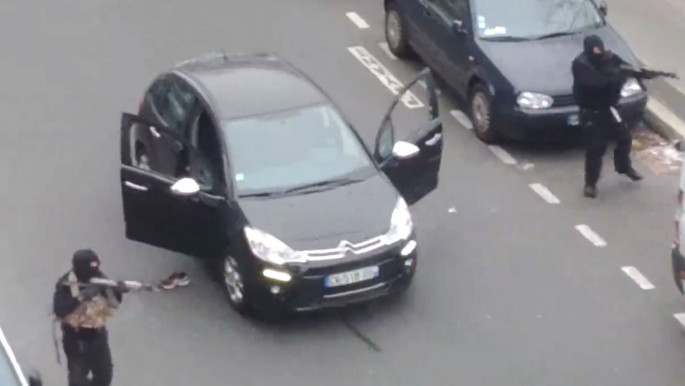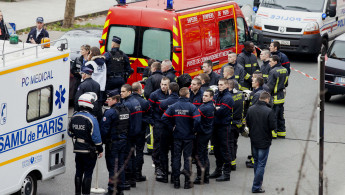Huge manhunt launched after 12 killed at Paris magazine
A huge manhunt has been launched in France after masked gunmen killed 12 people in an attack on the Paris offices of a satirical magazine, in one of the country's worst terrorist attacks for decades.
The attackers, armed with assault rifles, on Wednesday stormed the offices of Charlie Hebdo, a weekly magazine whose offices had previously been firebombed after it published caricatures of the Prophet Muhammad.
Five senior editorial staff were confirmed among the dead, including chief cartoonist and editor Stephane Charbonnier, known as Charb, and his deputy Bernard Maris.
| What now for France? Alain Gresh, editor of Le Monde Diplomatique, speaks to al-Araby al-Jadeed |
Two policemen were also killed in the attack in the 11th arrondissement in eastern Paris. One was shot in the head at close range as the attackers escaped the scene in a car.
The gunmen were wearing military style clothing, including what appeared to be bullet-proof vests.
A video on the website of the public broadcaster France Television showed the gunmen firing down a street. A shout, believed to be Arabic for "God is great", could be heard amid the gunshots.
A police source told the Liberation newspaper that the men appeared to know their targets inside the offices. "It was Charb they were targeting. The two attackers looked for him in the room, shouting, 'Where is Charb?' Where is Charb?'"
 |
|
| The gunmen fled the scene in a small car. |
"We heard shouting in the street," Benoit Bringer, who works on the same floor as the magazine’s offices, told France Info radio. "We saw hooded men carrying Kalashnikovs entering the building. We called the police.
"After a few minutes we heard heavy firing – a lot of firing, a hell of a lot. We went upstairs to take shelter on the roof. Then after about 10 minutes we saw two armed men come out on to the street. There was more shouting, more firing.
"Three policemen had arrived on bikes but had to leave because the men were armed, obviously… Then the attackers took off in a car."
Police said three attackers were involved - two who entered the building and a third who drove a car to the scene.
The Paris prosecutor's office confirmed 12 dead and five others in critical condition. Police said they had sealed central Paris as they hunted for those responsible.
The French president, Francois Hollande, called the assault "a terrorist attack... of exceptional barbarity", raised the country's security alert to its highest level and reinforced security at houses of worship, stores, media offices and transport hubs.
The attack was condemned by world leaders, including the German chancellor Angela Merkel, the British prime minister David Cameron and the US president, Barack Obama.
The Arab League said its chief, Nabil al-Arabi, "strongly condemns the terrorist attack" while Al-Azhar, Sunni Islam's most prominent centre of learning, called it a criminal attack and said that Islam denounced all violence.
| Murder in Paris: How brazen attack on Charlie Hebdo offices was tracked over social media |
Hebdo had in the past been threatened for its publication of caricatures of the Prophet. In 2006, it republished cartoons of the Prophet by a Danish newspaper, and successfully defended a court action by French Muslim groups saying their publication was a public insult and contravened the country's anti-racism laws.
One of the cartoons represented the Prophet wearing a turban fitted with a bomb, while another showed him greeting suicide bombers in heaven with the words "stop, we have run out of virgins".
In 2011, Hebdo's offices were attacked with petrol bombs after the magazine said it would publish a "sharia" edition, "guest edited" by Muhammad.
Sunni Islam forbids images of prophets and religious figures to prevent idolatry.
The attack on Wednesday also comes after the Islamic State group threatened France over its involvement in the US-led coalition against the IS in Syria and Iraq.
Christophe DeLoire of the media freedom group Reporters Without Borders described the assault as "the darkest day of the history of the French press".
In the evening, vigils were held in Paris, Berlin, Madrid and London, among other European cities, as members of the public showed their opposition to the attack and their support for the magazine.
Twitter users responded to the attack by starting a hashtag campaign, "Je suis Charlie" (I am Charlie), with the statement being posted hundreds of thousands of times within hours.





 Follow the Middle East's top stories in English at The New Arab on Google News
Follow the Middle East's top stories in English at The New Arab on Google News
![Israeli forces ordered bombed Gaza's Jabalia, ordering residents to leave [Getty]](/sites/default/files/styles/image_330x185/public/2176418030.jpeg?h=a5f2f23a&itok=_YGZaP1z)

